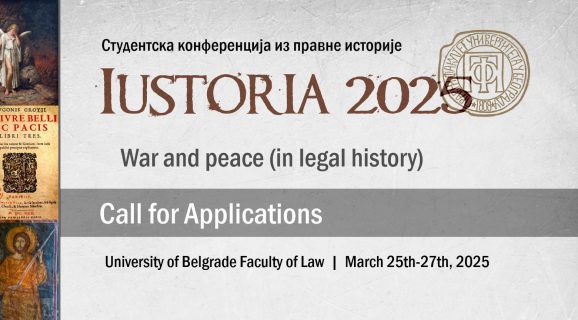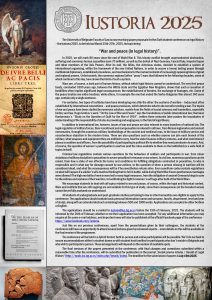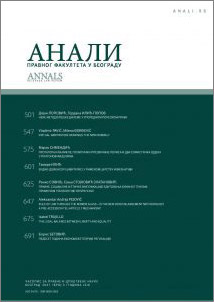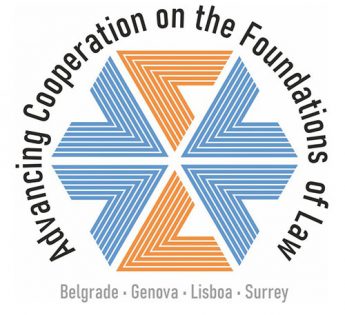
Iustoria 2025
 The University of Belgrade Faculty of Law is now receiving paper proposals for the Sixth student conference on legal history – the Iustoria 2025, to be held on March 25th-27th, 2025, its topic being “War and peace (in legal history)”.
The University of Belgrade Faculty of Law is now receiving paper proposals for the Sixth student conference on legal history – the Iustoria 2025, to be held on March 25th-27th, 2025, its topic being “War and peace (in legal history)”.
In 2025, we will mark 80 years since the end of World War II. This bloody conflict brought unprecedented destruction, suffering and enormous human casualties (over 70 million), as well as the defeat of Nazi Germany, Fascist Italy, Imperial Japan and other members of the Axis Powers. After its end, the Allies, the victorious states, decided to establish a system of international organising, within the framework of the new United Nations, in order to secure a (more) lasting peace through multilateral diplomacy, established procedures, and mechanisms for the mutual restraint of increasingly opposing blocs of great and regional powers. Unfortunately, the numerous regional (often “proxy”) wars that followed in the following decades, some of which continue to this day, have shown the limits of such a system.
Wars are, of course, a dark part of human history, without which legal history cannot be understood. The very first peace treaty, concluded 3300 years ago, between the Hittite state and the Egyptian New Kingdom, shows that such a cessation of hostilities often implies significant legal consequences: the establishment of borders, the exchange of hostages, etc. Some of the peace treaties are entire treatises, while others, for example the one that ended the Serbo-Bulgarian War almost 140 years ago, contain only a single sentence.
For centuries, two types of institutes have been developing one after the other: the customs of warfare – today most often established by international conventions – and peace provisions, which determine what to do next after ending a war. The topics of war and peace have been studied by numerous scholars, mainly from the fields of social sciences and humanities, especially history and law. Hugo Grotius’s work “On the Law of War and Peace” lays the foundations of public international law; Hermann Kantorowicz’s “Study on the Question of Guilt for the War of 1914”, written three centuries later pushes the boundaries of understanding of the responsibility of states in provoking and waging war, in the field of legal theory.
In addition to international law, however, issues of war and peace are also relevant in many branches of national law. The legal regulation of military forces, their recruitment and compensation is relevant in all laws, from Roman legionaries and ancient mercenaries, through the numerous military landholdings of the ancient and medieval eras, to the issue of military service and conscientious objection in the modern times. There are also questions such as whether anyone can join each branch of the military, what weapons and equipment they are entitled to carry, how the state finances military ventures, and what restrictions it places on soldiers and officers, from the possibility of participating in political life to whether they need permission to marry. And, of course, the question of women’s participation in warfare (and the roles available to them on the battlefield) is a wide field of topics in itself.
Criminal law regulations contain various sanctions for the behaviour of soldiers and participants in war, from minor violations of military discipline in peacetime to severe penalties for treason or war crimes. In civil law, numerous questions can be raised, from how a state of war affects the terms and conditions for fulfilling obligations contracted in peacetime, to who is responsible and in what way for damage caused by war actions, to the question of when a person missing in wartime will be considered dead, and what the consequences will be if he nevertheless returns alive. Even cuneiform codes contain regulations on what will happen if a soldier’s wife marries thinking that he fell in battle, while during World War II even posthumous marriages were allowed! The high mortality of men in wars led to many legal measures, from the obligation of ancient Germanic kings to care for the widows and orphans of their warriors, to facilitating the fight for women’s suffrage after both of the World Wars.
We encourage students to deal with all topics related to war and peace, of course, within the legal and historical context. Wars and conflicts that are still ongoing are not suitable for this type of study, since their consequences (in the broadest sense) cannot be yet fully analysed nor understood.
All students of undergraduate and post-graduate studies pertaining to law or other humanities are eligible to apply for the conference. The applications should contain basic personal information (name and surname, faculty, department, level and year of study), along with an extended abstract containing between 500 and 1000 words. Applications are accepted in either Serbian or English.
The applications should be e-mailed to iustoria@ius.bg.ac.rs before the 15th of February, 2025. The students will be informed by the 20th of February whether or not their application has been accepted. For any additional information you may enquire at the same e-mail address, and important news will also be published at the official Facebook page of the conference – https://www.facebook.com/iustoria
Just like on our previous conferences, apart from the presentations given by their colleagues, the students at the conference will have an opportunity to attend several lectures given by renowned experts – more details on this will be available in the final version of the programme.
The conference will be held in a hybrid format: both in-person and online participation will be possible. We’ll do our best to secure accommodations either in student dorms or with student host families for participants who don’t reside in Belgrade and who wish to participate in person. These arrangements will depend on the number of available spots.
The final versions of the papers presented at the conference, with final changes and corrections submitted within a reasonable time after the conference, will be submitted for publication in the journal „Vesnik pravne istorije / Herald of Legal History“ (http://epub.ius.bg.ac.rs/index.php/Vesnik/index). The deadline for the submission of papers is July 15th 2025.




